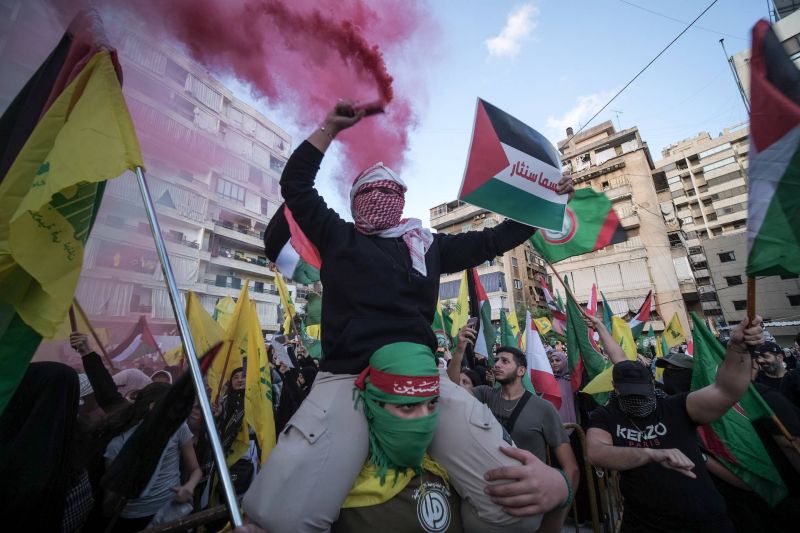
Hamas and Hezbollah supporters wave Palestinian flags at a rally in Beirut, October 2023. (Credit: João Sousa/L'Orient Today)
BEIRUT — A week ago, in Beirut's southern suburbs, a rare meeting was held between Hamas and Houthi officials.
According to AFP, this “coordination” meeting was an opportunity for Hezbollah to bring together these key regional players, whom it considers its allies. Supporting the Palestinian Hamas movement, the Yemeni Houthis have been obstructing the maritime route through the Red Sea, to prevent the passage of Israeli cargo. These actions have brought the Houthis international condemnation. Meanwhile, in Lebanon, Hezbollah has turned Beirut into the capital of the Iran-aligned camp, showing support for the group's campaign.
Quoting Palestinian sources, AFP reported that an “important meeting” took place last week in Beirut, and was attended by senior officials from Hamas, the Palestinian Islamic Jihad, and the Popular Front for the Liberation of Palestine (PFLP, Marxist), together with Houthi leaders. According to AFP, it was an opportunity to discuss “mechanisms to coordinate their actions of resistance for the next stage” of the war that has dragged on since Oct. 7, 2023.
On Saturday, an unnamed Houthi official told AFP that the meeting focused on “expending confrontations and encircling the Israeli entity, as [Houthi leader] Abdul Malek al-Houthi said." Officially, Hezbollah did not take part in the meeting. However, it is almost impossible for such a meeting to take place in Hezbollah’s stronghold without its involvement.
Anonymous sources told L’Orient-Le Jour that Hezbollah was the one that organized this coordination meeting, ahead of another meeting held in the capital last week between Hezbollah Secretary-General Hassan Nasrallah and Hamas’ deputy in Gaza Khalil al-Hayya. According to his subsequent press release, Nasrallah and the Palestinian delegation discussed “the latest developments on the ground in the Gaza Strip, the West Bank, and the multiple fronts of support [southern Lebanon and Yemen]."
Hezbollah did not respond to L’Orient-Le Jour’s request for comment. A source close to Hamas confirmed to L’Orient-Le Jour that the meeting was held, but declined to give further details.
Iran wants de-escalation
Fearful of widening its confrontation with Israel, Hezbollah appears to be placing the Houthis and Hamas at the forefront of the battle.
“Our front will remain a front of support at all times,” Nasrallah stated in his last discourse. An all-out war with Israel could prove very costly for the party both domestically and regionally, and it could mean losing the political capital it has built up since 2006.
Despite being the most influential figure in this axis since the United States' assassination of Qassim Soleimani, head of the Iranian Guard’s foreign operations, Nasrallah has kept a low profile since Oct. 7. He prefers to hide behind Hamas and above all Yemen, which he referred to as the most important and “courageous” support front. He even allocated entire sections of every speech he has made since Oct.7 to his Yemeni allies.
Through organizing the Hamas-Houthi meeting, Hezbollah appears to be maintaining the same logic, to keep its status as the most senior faction of the “resistance.” Meanwhile, Hamas and the Houthis are becoming increasingly powerful and popular, gaining the Arab public’s favor in much the same way that Hezbollah did during the July 2006 war.
This is in part due to Iran’s strategy. Despite financing and training its proxies and allies, the Islamic Republic provides some room for maneuvering under the pretext of giving them freedom and choice — likely to prevent further alienation from the international community, and above all, to avoid the risk of a wider conflict.
In February, Qassim Soleimani’s replacement, General Esmail Ghaani, and Nasrallah met in Beirut. During the meeting, Nasrallah reportedly expressed not wanting Tehran to be drawn into a war with Israel or the US, and that Hezbollah would fight alone if clashes in south Lebanon were to spread. Anonymous sources told L’Orient-Le Jour that General Ghaani stressed the importance of de-escalation to his Lebanese host.
Opposition protests
While Hezbollah has turned Beirut into a central location for the Iran-aligned axis, the anti-Hezbollah “sovereignist” camp perceives this as a serious drift. “Hezbollah is showing everyone that it does not care whatsoever about Lebanese sovereignty,” Tripoli MP Ashraf Rifi told L’Orient-Le Jour. “While it is steering its own diplomacy, welcoming in Beirut groups deemed as terrorists, the government remains powerless.”
Rifi, a former justice minister, accused Hezbollah of deliberately weakening the central state so it could freely pursue its independent policies.
MP Ghayath Yazbeck (Lebanese Forces (LF)/Batroun) agreed. “Not only does Hezbollah conduct its own diplomacy, but worse still, it welcomes and protects the Houthis, even though it knows that this will risk damaging our relations with Arab states, particularly Saudi Arabia,” Yazbeck said.
Riyadh waged war against the Houthis in Yemen for many years. Things between the two have slightly eased since the Kingdom took steps to restore ties with Iran in March 2023. “Whatever happens, the Arabs won’t hold it against us,” said Rifi. “They know that the country is hijacked by Tehran.”
This article was originally published in French in L'Orient-Le Jour. Translation by Joelle El Khoury.